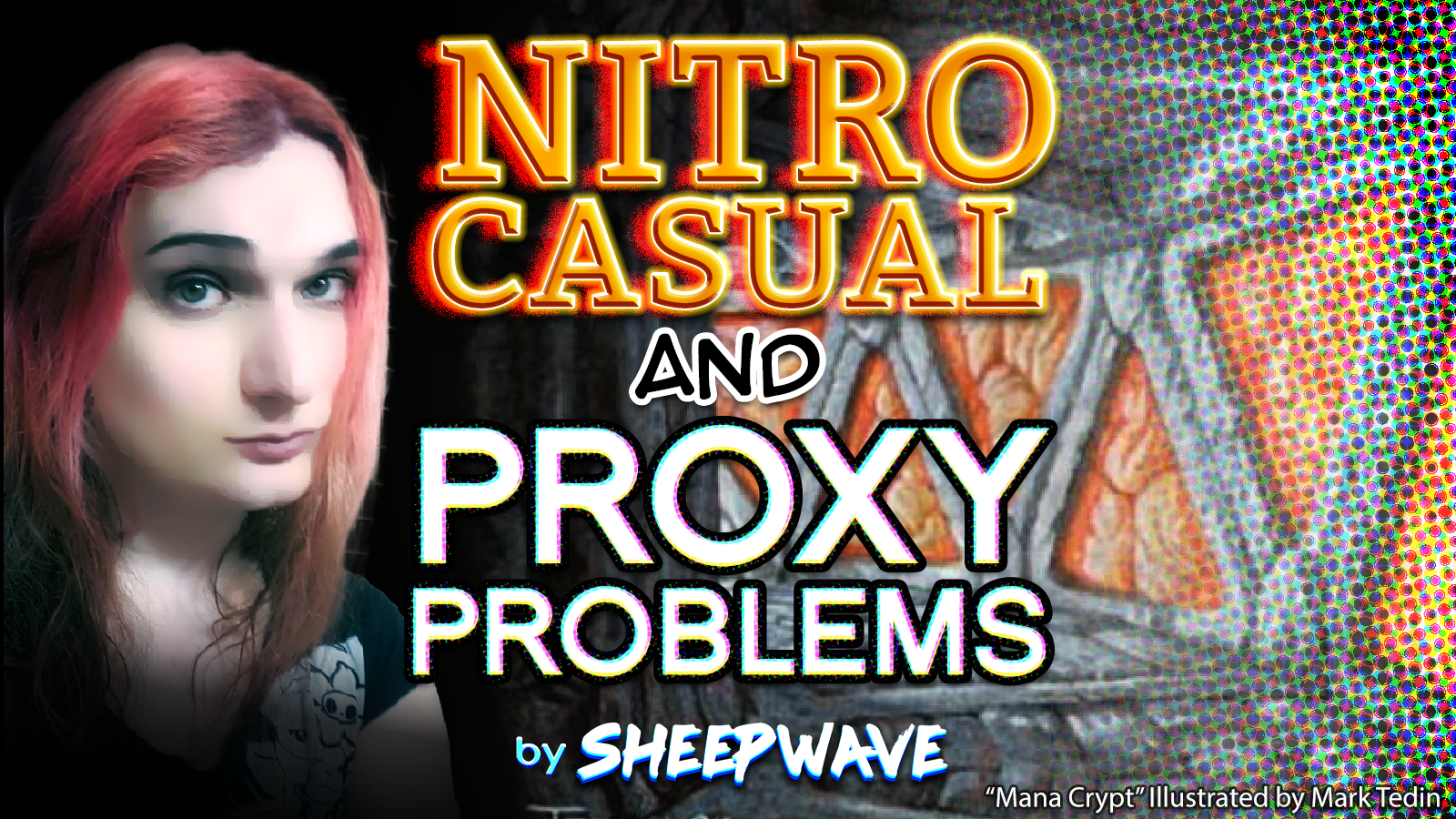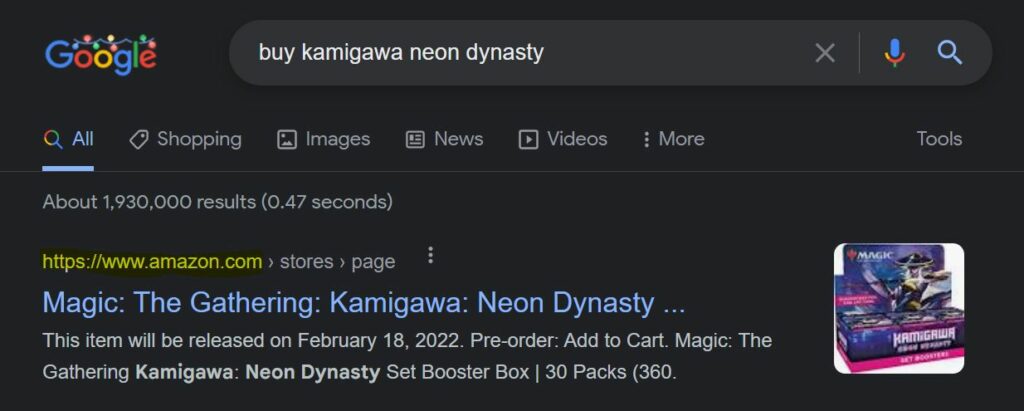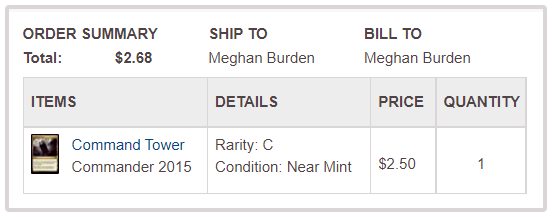Power Level Imbalance and Proxies

Sheepwave here. Proxy artist, sadistic electronic designer, and more. Let's get right into it.
Many people who play Commander in public spaces often feel they are forced to participate in an arms race. I think most of us have experienced this: the LGS meta that isn't quite cEDH, but where a few regulars have decks that slam Mana Crypt, Jeweled Lotus, Mana Vault, Smothering Tithe, Rhystic study, and other best-in-format cards onto the table with monotonous regularity. I call this style of deckbuilding "Nitro-Casual": a deck that is accelerating itself towards "fair wincons" so quickly that it shuts other players out of being able to meaningfully contribute to a game.
I am aware that my definition is quite similar to another commonly used term, "pubstomper", but I prefer mine because it's more clear. Also, it avoids sending more hate the way of cEDH players who just want to play against other cEDH players. The term is also not the same as "high power". A meta full of decks that operate at this kind of speed is simply a fast but balanced meta, and if everyone involved is happy with it, then there's no problem.
The label is specific for when a deck is being built with one mindset, but the player is unaware of how much more powerful it is than they think. I believe this is the cause of almost all experiences of games with severe power imbalances. While people who truly do want to stomp on others do exist, I think they are a tiny minority. From my perspective, Nitro-Casual building is a problem in ways that people just being jerks isn't. It's easy to do by accident, and hard to realize you've done it once you have.
I am going to examine a few angles in which use of proxies (or playtest cards) can alleviate this problem. I am also going to talk about why I think proxying does not actually fix the problem at all, and can even make it worse. Proxying is a tool like any other: when used correctly it can accomplish fantastic things, but it can be misused as well.
"Proxy Cards You Own"
While many people think of "proxying" as a specifically anti-materialist action that has no regard for if you own official copies of cards, this definition is not universal. It also has a massive problem: you cannot play proxies in anything that is sanctioned. While Commander is not generally something Wizards runs tournaments for, many stores run sanctioned Commander leagues, and things like CommandFests are still uncertain territory.
Some people also think that players using proxies hurts the revenue of game stores, which is absolutely laughable. Wizards pushing Amazon as the way to buy cards has done literally thousands of times more damage than some guy making duals on his work printer.

In theory, a person could play any EDH deck even in sanctioned events if they owned a single copy of every card they intend to run in a box, and assemble the deck from a list before playing. While there are players who do exactly this, in practice, such a system is time-consuming and a little impractical.
What is more common, even advocated for at one point on The Command Zone podcast, is using blank checkmark cards for expensive staples that you specifically intend to run in multiple decks, but leaving most of the deck as the actual cards. Then when you draw the checkmark card, you can replace it with the real copy of the card from a separate box.
I opted to go one step further, and make a binder of every staple I could run, with no intention to ever take cards out of it, but simply act as proof of ownership. This is mainly just because I need to be able to have decks I can legally play in sanctioned Commander events. My position as a content creator makes it a business expense for me. Definitely not for any petty reasons at all.

But in the process of making my decks only contain cards I own at least one copy of, I ran into a serious problem. Months ago, I removed Sol Ring, Rhystic Study, Smothering Tithe, and every single other game-warping, best-in-format card from all of my decks (more on that later) unless it had a specific mechanical synergy. I happen to own a copy of every one of them. Know what I don't own? Endless Horizons. There are so many underplayed weird jank cards I love that happen to be in a very annoying price range where it feels hard to justify buying it to run it in only a single deck. Endless Horizons ended up getting replaced by Dockside Extortionist. Random weird niche lands got cut for more offcolor fetches.
It is my honest belief that "Proxy any card you own" is the worst possible compromise, managing to combine the downsides of both extremes with none of the upsides.
Switching to this scheme turned the decks I had built to be slower-paced, unique, and social back into the broken piles of staple soup I had worked so hard to stop them from being. Using this system turned every single one of my decks into a Nitro-Casual deck. "Proxy what you own" also has the ability to create the worst player imaginable: one who thinks it's okay if they run proxies of Mana Crypt in every single one of their decks, but not okay for others to do the same. I really do not understand why so many people think being pro-proxy means using a system where there are still haves and have-nots, but the haves get to do even more than they do under a no-proxy system.

I think in most cases, people who are highly invested in Magic have a knee-jerk response to want to justify their participation in the system, similarly to how people feel judged if you tell them you are vegetarian, or rally behind billion-dollar video game corporations to defend them from fairly unremarkable feminist critiques of their products. So, if this system is so bad, "Proxy Anything" must surely be better, right? Well, it is, but it has some problems of its own. Time to rewind four years, when I first started playing EDH.
"Proxy Anything"
The idea that I could play suboptimally was what made me interested in playing EDH after having sworn off Magic entirely ten years prior. I quit the game because I felt paywalled out, having to buy four copies of competitive cards was too much for teenage me, and it wasn't worth putting up with the physical danger of being around competitive Magic players.

The idea of a casual format that didn't need playsets of expensive cards pulled me in and made me excited about finally getting to build a three-color deck. I could even buy only one of a few cards, and then swap them between decks. I made a Kess, Dissident Mage deck from stuff I had lying around, went to the nearest LGS, and-
We All Know What Happened Next.
The first time I had ever seen a Mana Crypt was turn one of my first 4-player EDH game. To describe the experience as demoralizing would be putting it lightly; I felt like a spectator in a game being played by two of the four people in the game. At the time, I was a schoolteacher, and had absolutely no intention of buying in to the format to the degree required to make any impact on the board states a few regulars would always end up with. Having nowhere to play EDH but in a meta defined by the Nitro-Casual arms race changes how you imagine the average game plays in a vacuum.
Once I decided to move on to a better group, I almost immediately switched over to using manabases that ran on lots of offcolor fetches, true duals, and shocklands. Perfect mana that entered untapped was just how I wanted to play after months of slogging through taplands and colorscrew. Once you are already proxying thousands of dollars of worth of cards in your deck, things that were always out of reach become enticing. "Vilis, Broker of Blood is so expensive to cast and the deck doesn't do anything until I do, so I really should be putting in enough fast mana to get them out ASAP." I played my Vilis deck exactly twice before realizing it wasn't fun for anyone but me.
I have been in games where it felt that someone proxying whatever they wanted caused a power imbalance. On more than one occasion, I have been that person.
The reason I started playing increasingly broken nonsense the moment financial restrictions were removed was not because of proxies themselves. It was because playing in an LGS that replaced conversation with a paywall had left me without the tools to communicate and listen for what experience people wanted to have. I had not been given an opportunity to even figure out what kind of games I liked yet.
I got into EDH pursuing the feeling of playing decks made from whatever cards we happened to own at recess. I left Magic because I was exhausted by optimization, yet here I was, with decks crammed full of the best cards in the format yet again, feeling like I had to constantly adapt and upgrade or I wouldn't be able to contribute. This realization is why I decided to take the step of removing many of the format's most powerful cards from my decks. I have come to a better understanding of what I enjoy as a player.
The Real Solution: Social Contracts
I wish I had a perfect solution for the problem of Nitro-Casual gameplay feeling increasingly like it is the new casual. My ideal casual EDH is a game where every player has a chance to meaningfully contribute. Every single game I have played recently has used unlimited mulligans because the format is now moving so fast that hands that don't contain ramp and a card advantage engine will doom you to having no meaningful contribution to a game.
There is a subformat of EDH where games are decided largely by efficiently leveraging the resources of opening hands and not much more. For those who enjoy this kind of game, I cannot recommend trying cEDH enough. The meta is a lot more diverse than you might think, and the entire format is proxy-friendly, making the cost to entry almost zero. The cEDH database is a great place to start.
But for those of us who are increasingly feeling pressured out of the laid-back side of the format by optimization creep, you have only one tool that will do any good: talking. People will literally let you play illegal cards if you talk about it first. It is challenging and difficult to tell someone in your playgroup that the decks they play are so explosive you don't even feel sure your presence at the end of the game mattered. However, they're going to be a lot more upset if you decide to simply stop playing with them altogether.
Learning more about how real games of cEDH play may make people realize just how close to the line they really are, and that the only difference between what they play is that one combos with Thassa's Oracle and the other combos with Craterhoof Behemoth a turn or so later.
If you play in an LGS with strangers, the best advice I have is to turn some of those strangers into buddies. It is far easier for two or more people to advocate for the kind of Magic they want to play than it is alone. I also have 10-card "sideboards" for all of my decks that I can swap in to power them up, which allows me to leave the deck more relaxed by default, but able to play fast if needed. You should be willing to self advocate and never accept someone repeatedly ruining your gameplay experience, proxy or not.
Wrap-up
The takeaway I hope people get is the meaning of Nitro-Casual: decks so reliant on optimized engine cards that it barely matters what else is going on, that can open up with acceleration or tutor into these Best-In-Format cards so consistently that they minimize the variance that gives singleton formats their identity.
The more of this kind of card you have, the more they feed each other. I tend to only run one or two cards from this category in a deck, or none at all. Every single one of them has the potential to create game-warping situations. If there are 8 of these cards in your deck, your odds of having an opening hand or mulligan with one of them is almost 90 percent. A deck that has 90% odds to have a game-warping opener is not something I would consider casual.
If you're curious to know what cards I personally think are the worst offenders when it comes to pushing Nitro-Casual gameplay, these are a few examples. I don't think these cards should be banned, and I'm not saying a deck should never have any of these. There are also lots of cards, like Altar of Dementia, Skullclamp or Underworld Breach, which are deck-dependent. Certain strategies, like Landfall, are naturally inclined to this play pattern and it's important to be aware that these decks are almost always stronger than you think they are.
I suspect this won't be the last time I talk about the complicated situation that is casual power balance, but I'll leave you with this for today. -Sheepwave